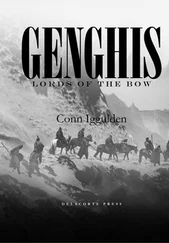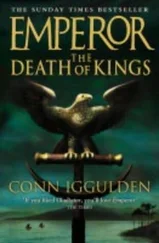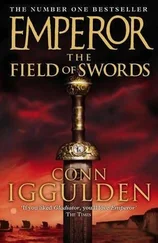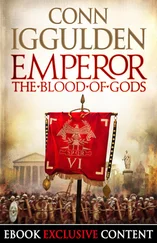The death of Caesar happened on the ides (the fifteenth day) of March in 44 B.C. The Senate was indeed meeting in Pompey's theater, though how many witnessed the murder is unknown. After a lot of thought, I did not include the fact that Caesar was handed a scroll warning him of the conspiracy. The man who passed it into his hands had once been employed by Brutus, and the suspicion will always be there that Brutus himself was behind the warning, as complex a man as Caesar himself. It was never read and I felt this was an unnecessary complication.
Tillius Cimber held Caesar for the first blow by Casca-the first of twenty-three wounds. Only one was directly fatal, which shows the chaos of the murder. Caesar struggled until he saw Brutus was part of it, then pulled his toga over his head and sat like stone until they had completed their task. The courage of such an act defies description.
The night before, Caesar is said to have expressed a preference for a quick end rather than the agony of disease or weakness. His epilepsy may have troubled him, but a man does not welcome death and plan a campaign in Parthia at the same time. Nor does he give up the struggle for life when he has, at last, a son to follow his line. Suetonius said he was fifty-five years old, though the figure cannot be certain, as his birth date is unknown.
Julius Caesar named Octavian his heir in his will and it is one of the great tragedies that Octavian did not allow Ptolemy Caesarion to reach manhood. Though Cleopatra fled back to Egypt after the murder, it did not save her, or her young son. Perhaps it is true that those who have power do not allow future enemies to grow, but it does seem a particularly pitiless act.
History is littered with the stories of men who rose through fire and battle to positions of power-only to have their empires shattered on their deaths. Caesar achieved a position in Rome that no one else had ever managed on such a scale. He used the power to introduce a new calendar, give citizenship to all doctors and teachers, and move eighty thousand of the poorest to new starts in colonies. He gave every Roman three hundred sesterces, grain, and oil. His legions were made rich to a man, with the centurions alone receiving ten thousand silver coins each. His Triumphs were unparalleled, including using the Tiber to flood a great basin on the Campus Martius for a violent "sea battle." Tens of thousands attended his banquets. Yet perhaps his greatest good fortune was to be followed by Octavian, who took the name Gaius Julius Caesar to honor him and was only later known as Augustus. It was his steady hand that birthed the longest empire the world has ever known. Augustus was the first emperor, but Julius Caesar prepared his seat.
I have never been able to believe that Brutus took part in the murder of Julius Caesar out of a desire to restore the Republic. That was certainly the reason he gave and he had coins made that actually celebrate the events of the ides of March. I think the complex relationship with Servilia played a part, brought to a head by the fact that Julius had at last fathered an heir. As Servilia survived Julius, she also survived her son and was brought his ashes after the battle of Philippi.
One change that I have made in these pages also has a bearing on Brutus's motives. Caesar's daughter, Julia, was originally promised to Brutus, a union that would have helped his rise through the echelons of Roman society. Always the pragmatist, Julius broke off the engagement to give her to Pompey instead. These are more human reasons for hatred, but the strongest may be the subtleties of envy and frustration in their own relationship. The final damage may simply have been that Julius publicly forgave the betrayal at Pharsalus. For Brutus, I suspect that would have been unbearable.
On a final note, I called this series "Emperor" as I intended to show how the era of men such as Marius, Cato, Sulla, and Julius created the empire that followed. The title "Imperator" was given to any successful general. Julius may not have been crowned, but in everything but name, he was the one who brought the empire into the world.
In years to come, I may have to write the story of the aftermath of the assassination. Not a single man who stood with bloody hands in Pompey's theater died a natural death. In its way, it is a tale as great as any other, but it will have to wait for another day.
Конец ознакомительного отрывка
Купить книгу












